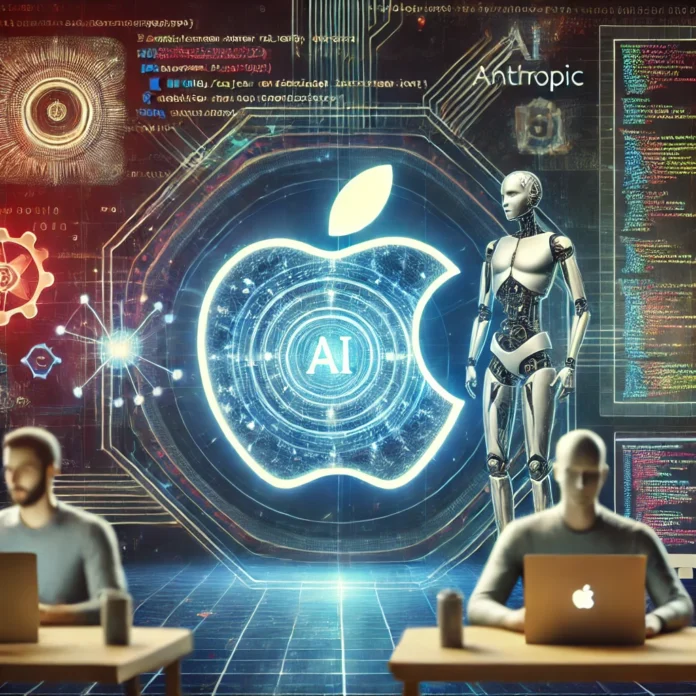The world of software development may be on the verge of another significant shift, as reports emerge of a high-profile collaboration between tech giant Apple and leading AI research company Anthropic. According to sources cited by Bloomberg and other tech news outlets on May 5th, 2025, the two companies are working together to build a next-generation software development platform leveraging Anthropic’s powerful artificial intelligence, specifically its Claude family of models.
This initiative aims to create sophisticated tools designed to assist programmers by automating and accelerating various aspects of the coding lifecycle. The platform reportedly allows developers to generate, edit, and test code through a conversational chat interface. It’s envisioned to handle tasks ranging from writing new code blocks based on natural language prompts to identifying and fixing bugs, potentially even managing user interface testing.
Apple has reportedly already begun rolling out this AI-powered coding software internally to its own engineers. While a significant step demonstrating confidence in the technology, the company has not yet decided whether this powerful tool will eventually be made available to the vast ecosystem of third-party developers who build applications for iOS, macOS, and other Apple platforms.
Why Anthropic and Claude?
Anthropic has rapidly established itself as a major player in the AI landscape, known for its focus on creating reliable, interpretable, and steerable AI systems. Its Claude family of large language models (LLMs), including the recent Claude 3.5 Sonnet and potentially earlier versions like Claude 3 Sonnet mentioned in relation to the partnership, competes directly with offerings from OpenAI (GPT series) and Google (Gemini). Anthropic’s emphasis on safety and constitutional AI aligns well with Apple’s traditionally cautious and user-centric approach to technology adoption.
The timing of this collaboration is also critical. The use of AI assistants in software development is exploding. Microsoft’s GitHub Copilot, powered by OpenAI’s models, has already demonstrated significant market traction, reportedly attracting nearly 2 million paying subscribers and substantially boosting GitHub’s revenue. Other tech giants like Google and Amazon, along with numerous startups, are also fiercely competing in this space, developing their own AI coding assistants. This reported move by Apple signifies its intention to remain at the forefront of developer tools and productivity, potentially integrating AI more deeply into its own development workflows first.
Potential Impact and Market Context
The immediate impact, should the reports be accurate, is a potential surge in productivity for Apple’s internal software engineering teams. Faster development cycles, more efficient bug fixing, and the ability to automate repetitive coding tasks could accelerate innovation across Apple’s product lines. Research firms like McKinsey have previously estimated that AI could boost software engineering productivity by a staggering 20% to 45%.
The larger question looms over a potential release to external developers. Providing such a tool could significantly enhance the appeal of Apple’s ecosystem, empowering developers to build and iterate on apps more quickly. It could streamline the development process for millions, potentially leading to more sophisticated and polished applications on the App Store. However, it would also place Apple in direct competition with established players like GitHub Copilot and potentially even tools from its partner, Anthropic, if offered independently.
This collaboration underscores Apple’s evolving AI strategy. While often perceived as lagging in the generative AI race compared to rivals making splashier announcements, Apple has a history of integrating complex technologies seamlessly into its products. This coding platform could be a prime example – a powerful AI tool initially honed internally before potentially reshaping its broader developer ecosystem.
The partnership also highlights the symbiotic relationship between major tech companies and AI labs. Anthropic gains a highly influential partner and a demanding proving ground for its technology, while Apple gets access to cutting-edge AI tailored for a critical business function. Amazon’s significant investment in Anthropic and Anthropic’s use of AWS cloud infrastructure further illustrate these complex, interwoven dynamics in the AI industry.
As the AI revolution continues to reshape industries, software development stands out as one of the most immediately impacted fields. While AI isn’t replacing human programmers – design, architecture, and critical thinking remain essential – it is rapidly becoming an indispensable co-pilot. Apple’s reported venture with Anthropic signals a strong commitment to harnessing this transformation, promising potentially significant advancements for its engineers and, perhaps eventually, the wider developer community.




